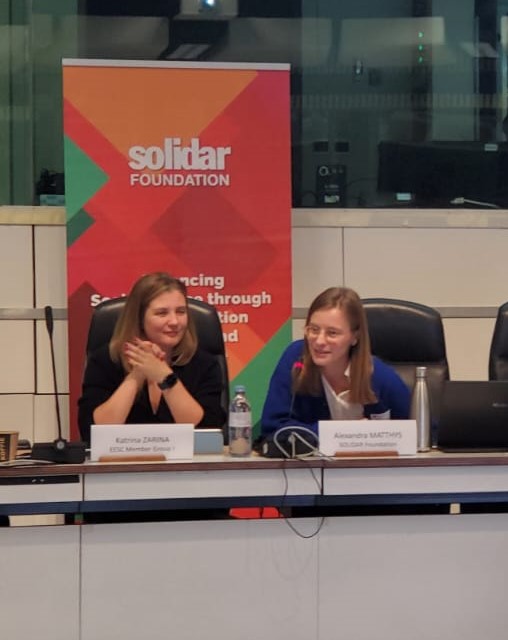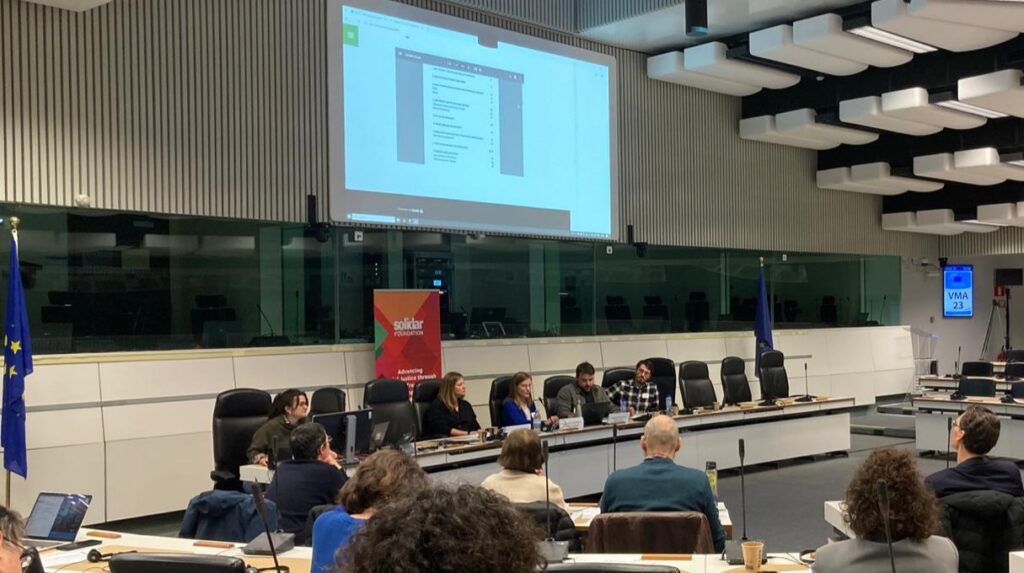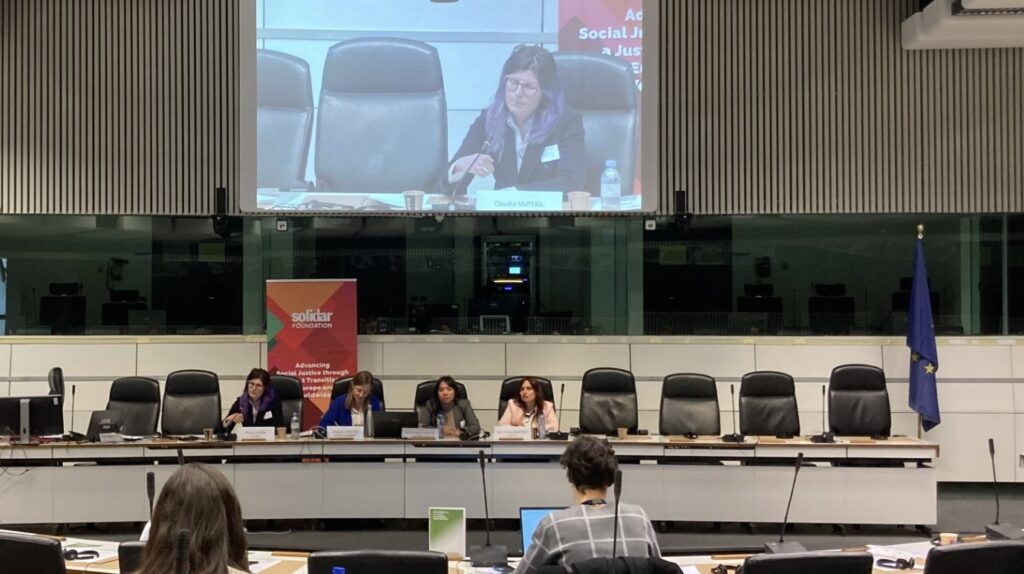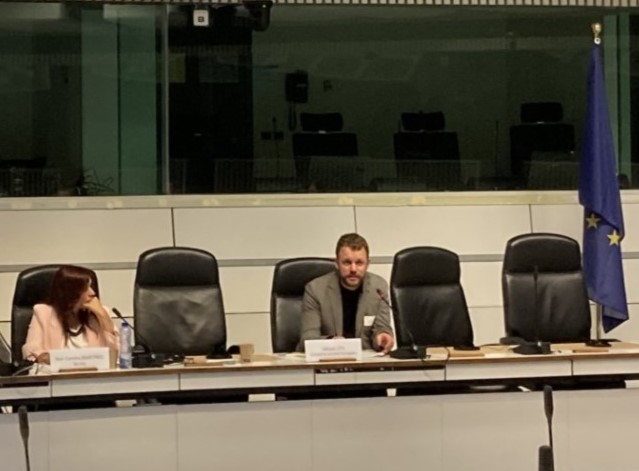ECHO Network Final Conference – Towards a more Ethical Digital Transition
On Tuesday November 5 SOLIDAR Foundation organised the ECHO Network Policy Roundtable: Towards A More Ethical Digital Transition at the EESC where the outcomes of the ECHO Network project were presented. The event was attended by CSO representatives, European experts and policymakers, to discuss the topic of an ethical and sustainable digital transition.

ECHO (Ethical, Common, Human and Open) Network is a project running until November 2024 which intends to promote digital citizenship and responsible use of digital technology, providing youth, citizens and organisations with a clear understanding of how to use digital technology ethically, and focuses on how EU institutions address this matter to safeguard citizens.
Welcome and Introduction to the Work of EESC Rapporteurs
Katrina Zarina, member of the EESC Member Group I, welcomed all participants to the event. Katrina talked about her work as a EESC rapporteur of the Evaluation Report INT/1054 on the Digital Europe Programme. To evaluate the Digital Europe Programme, which aimed at supporting digitalisation across the EU in a wide array of areas, EESC members visited five EU countries in different regions. In addition to the fact-finding mission, the rapporteurs received contributions from more than 160 civil society organisations (CSO), conducted interviews and an online survey. To conclude her presentation of the report, Ms Zarina explained some of the recommendations and lessons learned. For example, she highlighted that it is important to not only talk about advanced digital skills but also focus on basic digital skills which many people lack. She concluded her intervention by stressing the importance of CSO involvement, noting that in the design and and implementation of the Digital Europe Programme CSOs were not sufficiently involved which prevented the programme from achieving its full potential. Click here to access the full report.
Afterwards, Alexandra Matthys, Education & Lifelong Learning Officer, SOLIDAR Foundation, welcomed all participants and introduced the agenda of the event.
Presentation of the Project Outcomes and the ECHO Plea
This was followed by project coordinator Morgane Peroche, CEMEA France, introducing the ECHO Network project. She shared that CEMEA started to reflect on the use of ethical digital tools a few years ago and the Covid19 pandemic showed the urgency to expand their work into a European project to give it a wider scope. She then introduced one of the project results: the ECHO Network website. While the website is not final yet, it will continue to be developed over the months and years to come as it is conceived to be a standing common space to promote educational resources and pedagogical approaches. The presentation of project outputs is concluded by Morgane, who presented the resources available to educators on the website, Giovanni Panza, CEMEA Italia, showcased the survival kit for CSOs, and Thomas Citharel, Framasoft, explained how the website was created using free software, is hosted by CEMEA and therefore does not share any data with big tech for profit-driven companies.
To finish the presentation of the ECHO Network project, Alexandra presented the ECHO Network Plea for an Ethical and Sustainable Digital Transition. The document builds on the findings of the ECHO Network project and advocates for an ethical and sustainable digital transition. It contains a plea to European policymakers to promote ethical, responsible, inclusive and sustainable use of digital technology and policy recommendations on how to achieve it.

The Policy Roundtable: Towards a more Ethical Digital Transition

The Policy Roundtable, moderated by Alexandra, constituted the second half of the event. The participants were:
- Naír Carrera Martínez, Policy assistant, DG EAC: Naír elaborated on how the Digital Education Action Plan (DEAP) aligns with the various EU strategies on digital transition and digitisation such as the AI Act and the DSA. She emphasised that one of the goals of DEAP is to foster a critical understanding of digital technologies in education. Furthermore, Naír explained how the DEAP can help in prioritizing the development of digital competences in order to tackle the concerning lack of basic digital skills in the EU. Concluding on a forward looking note, Nair expanded on some of the emerging areas the EU will address to enhance digital education and well-being, and how these initiatives will adapt to rapid advancements in AI, data privacy, and ethical digital practices. Based on the DEAP mid-term review, a roadmap will be developed to define actions and initiatives to address some of these challenges.
- Claudia Matera, Chief Development Officer and Deputy CEO, ALL DIGITAL: Claudia reiterated the issue of people lacking basic digital skills and the importance of non-formal and informal education in acquiring these skills, and reaching certain (vulnerable) groups in society. Claudia stressed the environmental impact of the digital transition, like the amount of energy required for AI tasks, and that this environmental aspect of the digital transition should be be put in the spotlight instead of being underestimated. She discussed ALL DIGITAL’s work on DigComp as they host and facilitate the DigComp Community of Practice, and have developed a tailored training programme for anyone willing to adopt the framework in their organisation or work. On the topic of how digital competences could be better certified, she suggested that an updated DigComp could facilitate the precise identification of the digital competences to be certified which would ensure that the EDSC (European Digital Skills Certificate) is both a reliable and consistent tool for validating digital competences across different sectors and educational systems.
- Janine Patricia Santos, Policy Adviser, EDRi: Janine started her intervention with highlighting the importance to be critical towards the concept of “ethical”, and to make sure this concept is not co-opted leading to less regulation to give way to innovation. She shared EDRi’s view on an ethical digital space, which is centered around being an accessible, inclusive, and empowering space, especially for marginalised communities and communities affected by intersectional online/offline harms. Janine expanded the discussion by stating that it must be a choice to engage in activities online and that essential services must still be accessible offline, giving the right to offline campaign supported by EDRi and SOLIDAR Foundation as an example, which highlights the need of essential services to be accessible offline. Sharing more about EDRI’s work she pointed out the importance of building coalitions, such as their coordination of the DSA Coalition to cooperate with social justice organisations that might lack the capacity or knowledge to work on digital matters to ground their work.
Mikael Leyi, General Secretary SOLIDAR & SOLIDAR Foundation, closed the event by thanking all speakers and participants. Mikael stresses the importance of a fair digital transition, which is a topic that is close to SOLIDAR & SOLIDAR Foundation’s heart, and the ECHO Network project was key for SOLIDAR to strengthen its work on the digital transition further. Though ECHO Network project is coming to an end, SOLIDAR & SOLIDAR Foundation will continue to strive for a more ethical and digital space as technologies must serve the people, driving social progress and fostering sustainable development.

This Policy Roundtable was organised in the framework of the ECHO Network Project, supported by the European Union.



